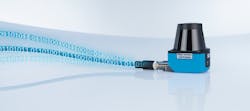TIM2xx Lidar Sensor Brings Laser-Based Ranging to New Levels
SICK has expanded its 2D LiDAR sensor offerings for localization and anti-collision applications with the compact TiM2xx product family. This is in response to the new requirements on functionality, size, and price.
Globally, the ecommerce sector continues to experience strong growth. This has also led to an increase in demand for automation solutions to support the growing logistics infrastructure and the transport of goods and products. Autonomous Mobile Robots (AMRs) are handling more logistics tasks of varying kinds. Simultaneously, the latest AMR designs are becoming increasingly compact and streamlined. Accordingly, 2D LiDAR sensor solutions need to keep pace with these new types of applications in terms of functionality, size, and price. With the TiM2xx series, SICK is launching a sensor that excels at all three.
The TiM240 is the first variant in the TiM2xx series and has an enclosure rating of IP65 for indoor use. The TiM240 scans a 240° area up to 10m away at speeds up to 15 times per second. This allows the user to cover a relatively large space (200m2) with one scanner and to quickly transmit any measurement changes to the controller via Ethernet. The tried-and-proven HDDM+ technology guarantees the stable and reliable output of measurement data. The low power consumption of 2.9 watts becomes a particular advantage when used in battery-operated vehicles.
At only 150g, the TiM240 is extremely lightweight and takes up very little space with its compact dimensions of 75.8mm x 79.7mm x 60mm (HxDxW). This enables it to be integrated into ever-shrinking AMRs and its weight does not require much consideration in the mechanical design. Other TiM families in the TiM series include TiM1xx, TiM3xx, TiM5xx, and TiM7xx.
The future brings new applications
In addition to industrial applications such as mobile automation, new areas of application for 2D LiDAR sensors are cropping up. For example, in the field of new smart, interactive media such as virtual nature walls or games. The TIM2xx scans the entire interactive surface and determines, for example, where a hand or the person is currently located. The data are processed, and a signal triggers a response that changes the image or opens an information window. The TiM240 is an excellent fit for these kinds of applications because it is small and delivers high quality data for not much money.
About SICK
SICK is one of the world’s leading manufacturers of sensors, safety systems, machine vision, encoders and automatic identification products for industrial applications. With more than 1,000 patents, SICK continues to lead the industry in new product innovations. The diversity of its product line allows SICK to offer solutions at every phase of production in the logistics, automotive, packaging, electronics, food and beverage, and material handling markets. Sensors from SICK also help companies embrace Industry 4.0 and leverage the power of their data. SICK AG was founded in 1946 and has operations or representation in 65 countries worldwide. Learn more at www.sick.com.

